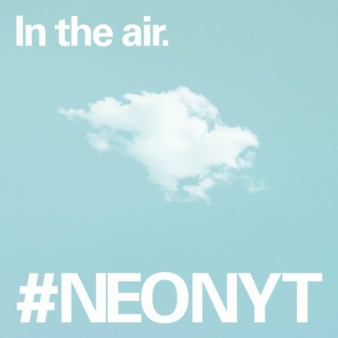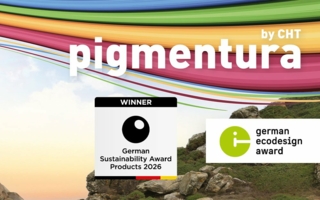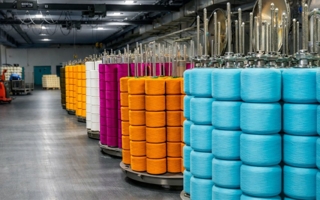02/01/2020 – Leading theme “air” — auf Deutsch lesen
Neonyt: Drive the Change
2020 has begun, and large parts of society are prepared to set new signposts for the climate and biodiversity, the oceans and the forests.
The climate summit in Madrid last December was a call to action, and Europe, too, is taking up arms against global warming. The new head of the EU Commission, Ursula von der Leyen, announced greater efforts on the part of Europe, saying, “We must put a price on CO2.” It all started just over four years ago when an agreement was signed off at the UN Paris climate conference in December 2015. The parties to the agreement set themselves the goal of limiting global warming due to human activity to substantially less than 2 °C, compared with the pre-industrial age. This can only be achieved if climate neutrality is reached by the second half of the 21st century.
Joining together to change the world: it is fast becoming clear that we cannot achieve such a goal working alone. New solutions and business models need to be developed: a deep and systemic transformation is required. And the fashion industry, as an important player on the world stage, has a major role to play. With 75 million employees around the world and generating 4 percent of global waste, the industry needs to change if the target is to be met.
According to WWF, the clothing and textile industry is responsible for 1.7 billion tonnes of CO2 emissions a year
That’s 3 percent of carbon emissions worldwide. According to an investigation by the UK-based Ellen MacArthur Foundation, the textile industry could be responsible for one quarter of all harmful CO2 emissions by 2050 and this needs to be stopped.
One way to achieve climate neutrality by 2050 is shown by the United Nations’ Agenda 2030, with its 17 sustainable development goals (SDGs). These goals are designed to secure sustainable development at an economic, social and ecological level. The Frankfurt trade fair organisation, Messe Frankfurt, has joined in by implementing its Texpertise Network platform to drive forward positive change. The Texpertise Network, which includes over 50 global textile and fashion fairs around the world, is collaborating with the Conscious Fashion Campaign and the United Nations Office for Partnerships. From January of this year, they will be presenting the UN’s sustainable development goals to their 22,000+ exhibitors and over half a million trade visitors.
Everyone can make a difference
“All companies within [the] fashion, retail and textile global value chain, regardless of size and geography, have opportunities to take action that will result in a measurable reduction in greenhouse gas emissions” – so says the first page of the Fashion Industry Charter for Climate Action, which was signed in December 2018 by 43 companies at the UN Climate Conference in Katowice, Poland. From Adidas and H&M to Stella McCartney, the number of participants has now risen to 88 companies and 28 supporting organisations, all of them committed to reducing their greenhouse gas emissions by 30 percent before the end of 2030. Working groups have been set up to analyse the potential for decarbonisation in the fashion sector.
It starts with the fibre
The different approaches from the various textile businesses are as diverse and complex as the textile value chain itself. It begins with the fibres, of which over 100 million tonnes are produced by the industry every year. Lenzing of Austria is a pioneering company in fibre production, with a clear climate strategy. As one of the signatories to the Fashion Industry Charter for Climate Action, Lenzing has set itself ambitious targets: by 2030, the Group plans to cut emissions per tonne of manufactured cellulose and fibre by 50 percent compared to 2017. This will save 1.3 million tonnes of CO2 across the Lenzing Group worldwide. The aim is to reduce net output of CO2 to zero by 2050.
Stefan Doboczky, Chair of the Lenzing Group board:
“Climate change is the greatest challenge currently facing mankind. As trailblazers in our industry, we can credibly accept responsibility for our children and grandchildren only if we act right now.”
But how exactly is Lenzing seeking to achieve this?
Fibres are manufactured at Lenzing from wood. The raw material is drawn from sustainably managed forests, which take up more carbon and hence serve to reduce the net output. The energy stored in the wood is used, too: the Group’s site in the Czech Republic, for example, is fully self-sufficient in terms of energy. Moreover, at the textile production stage, energy consumption and CO2 emissions across the entire value chain can be reduced by the use of a spin dyeing process such as that used for Lenzing Modal Eco-Color Fibres.
And not least, quick-drying products and clothing that need less frequent washing reduce power consumption in use. At the end of the product lifecycle, the cellulose from which the fibres are constituted returns to its original form, creating the basis for new plant growth – plants that once again take up carbon dioxide from the air and become a new valuable resource.
Neonyt makes air its leading theme in 2020
The machines used throughout the textile value chain also offer enormous potential for cutting the production of CO2. Between 14 and 16 January 2020, air was the guiding theme for Neonyt, the global hub for fashion, sustainability and innovation.
Christopher Veit, Director of Veit GmbH, sat on the stage of the Fashionsustain conference there and spoke about the change that was in the air. The company, which manufactures machines and equipment for ironing, fusing, pressing and finishing in clothing production, has been developing its eMotion system for over ten years now.
The kit’s ‘energy box’ can be connected to textile care machinery to control the distribution of steam, which amongst other benefits ensures that no more steam is used than is really necessary. This can save up to 40 percent of the energy used. Veit demonstrated how pioneering technology could help to make energy consumption more efficient, make more sparing use of resources, reduce costs and hence improve competitiveness.
One-time use of energy for heating purposes is another ecological challenge in the washing and cleaning industry. Fusing machines are the heaviest users; with its FX Diamond line, Veit has developed the ability to reduce consumption by half compared to industry standards. Cold ironing technology, moreover, can cut out heating costs entirely at every single workstation. But Veit is seeking to improve the industry not only through its machine innovations but also by taking account of the overall picture in its in-house processes. An analysis of the eco-footprint at its site in China showed that the greatest contributor to CO2 emissions lay in sea-freighting goods to Bangladesh. Through location optimisation, Veit is now working to improve this aspect of its supply chain too. “Too little attention is still paid to the issue of airborne emissions,” says Christopher Veit. “In textiles production and supply chains, there is so much potential to make a real change in that field.”
Read the whole article by Lena M. Kaufmann in the print edition 1-2/2020 with publication date 28 January.
You do not have a subscription yet? You can download a free trial copy HERE.




